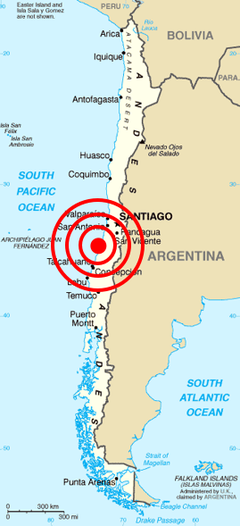It has been two years since a massive 8.8-magnitude earthquake devastated central Chile. According to official sources, it was the sixth largest quake ever recorded. Over 500 people lost their lives, and nearly one in ten Chileans lost their homes.

The financial aftershocks were also severe. The United Nations estimates that the earthquake cost Chile’s economy between $15 and $30 billion.
Among the many people and institutions affected, the earthquake had serious repercussions for Chilean universities and their libraries in the area near the epicenter, Concepción. Severely damaged library buildings had to be closed, books were moved to storage, and library services were suspended.
In June 2010, a hundred days after the disaster, a delegation co-sponsored by the U.S. State Department and the American Council on Education toured the affected universities. One of the members of that delegation was Deborah Jakubs, Rita DiGiallonardo Holloway University Librarian and Vice Provost for Library Affairs at Duke.
Jakubs spoke with the directors of the five Chilean libraries hit hardest by the earthquake and discussed measures that would assist their recovery efforts. Everyone agreed that a formal exchange of ideas, expertise, and face-to-face collaboration would offer extensive benefits to all institutions involved.
The first of those exchanges took place this spring, thanks to a grant from the Carnegie Corporation of New York. Tatiana Morales, librarian at the Universidad del Bío-Bío, and Paula Díaz of the Universidad Católica de la Santísima Concepción visited the Duke University Libraries for three weeks in March. They are the first of five librarians from Chilean universities who will visit Duke this year to observe the workings of a U.S. research library and take back ideas to their respective universities.

Because Duke is a member of the Triangle Research Libraries Network (TR LN), the visiting librarians will also meet with colleagues from the University of North Carolina at Chapel Hill, North Carolina Central University, and North Carolina State University to observe different models of library organization and learn about TR LN’s collaborative interlibrary programs.
Meanwhile, in May and June, Duke will send four library staff members to Chile to see the affected libraries up-close, and consult on collection development, strategic planning, electronic resource management, and instructional technology.
“Collaborating with Tatiana and Paula has afforded us the opportunity to consider the universal needs of the academic community,” said Debra Kurtz, Head of Digital Experience Services and one of the Duke representatives who will travel to Chile in June. “We look forward to meeting the second group of Chilean librarians and to our own trips to Santiago and Concepción. If you want a fresh perspective on the truly collaborative nature of global research, there’s no substitute for immersing yourself in other cultures.”
In recent years, Duke has hosted librarians from Mali, Turkey, Chile, China, and South Africa, and other countries have played host to our librarians as well. It’s one of many ways the Duke Libraries reflect the university’s global outlook and support Duke’s many international academic programs and networks.
“Libraries throughout the world are experiencing great changes, and the more we can share expertise, ideas, and models of service, the more we all stand to gain,” said Deborah Jakubs. “If previous programs of this type are any indication, the relationships formed between individuals as well as inter-institutionally will endure well beyond the grant period, leading to other joint projects in the future.”

The Duke-Chile Library Exchange: Participating People and Institutions
Duke University Libraries Representatives
Holly Ackerman, Librarian for Latin American, Iberian and Latino Studies
Aisha Harvey, Head of Collection Development
Debra Kurtz, Head of Digital Experience Services
Patrick Stawski, Human Rights Archivist
Chilean Library Representatives
Sandra Carrizo, Universidad de Talca
Paula Díaz, Universidad Católica de la Santísima Concepción
Manuel González, Universidad de Concepción
Carmen Gloria Herrera, Universidad Católica del Maule
Tatiana Morales, Universidad del Bío-Bío
In addition, the Pontifícia Universidad Católica in Santiago will host the Duke delegation for their initial two days in Chile.

